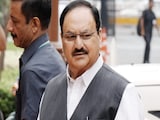Arvind Kejriwal's Aam Aadmi Party surged to power in Delhi for a third term, boosted by a massive mandate of 62 seats - just a shade lower than its record 67 seats of 2015. "I love you Delhi," the Chief Minister declared from the party office, predicting the beginning of a "new kind of politics" focussed on local issues and the government's delivery. Arvind Kejriwal will be the Chief Minister of Delhi for the third time.
Over the past five years, the former taxman-turned-anti-corruption crusader has learnt many lessons in politics, some bitter and at a heavy cost.
In 2013, his newly-formed Aam Aadmi Party (AAP) made an impressive debut in the Delhi election, but Arvind Kejriwal came off as a greenhorn by quitting after 49 days in power, in a fit of anger. "Runaway Chief Minister" was just one of the labels thrown at him.
But in the 2015 campaign, voters apparently accepted his mea culpa and AAP won a remarkable 67 of 70 seats.
Today, Arvind Kejriwal has gained far more confidence, but along the way, he has lost many friends, especially those with him in Anna Hazare's anti-corruption movement, like Yogendra Yadav, Prashant Bhushan, Kiran Bedi, Kumar Vishwas, and Anna Hazare himself.
The muffler is gone, replaced by a more contemporary look.
The name-calling by critics has progressed from dharna CM to anarchist to "terrorist".
First a BJP MP called him a terrorist, then Union Minister Prakash Javadekar said: "There is plenty of proof you are a terrorist. You had called yourself an anarchist; there is not much difference between an anarchist and terrorist."
Mr Kejriwal, a mechanical engineer from IIT-Kharagpur, joined the Indian Revenue Service in 1995. He left his job as a tax official in 2001 to join the anti-corruption campaign.
After leaving government service, he campaigned to bring in India's Right to Information Act in 2005, which earned him the Ramon Magsaysay Award in 2006.
Six years later, he teamed up with activist Anna Hazare to demand the anti-corruption Lokpal Bill.
Mr Kejriwal then made his dislike of politicians clear. After coming to power, all he appeared to do was to complain about the centre trying to block his government through the Lieutenant-Governor.
Over the years, he tempered that criticism and gradually stopped his outright attacks on Prime Minister Narendra Modi and the BJP. He even supported the ruling party on decisions like the one to end special status to Jammu and Kashmir under Article 370.
It was a conscious rebranding and an attempt to discard the image of an impulsive, angry and inexperienced politician. After PM Modi announced in parliament a trust to oversee the Ayodhya Ram temple, at the height of the Delhi election campaign, Mr Kejriwal was asked whether he saw a political motive. "I think it is a very good decision. I think the PM should keep making good announcements all the time. We welcome it," he said.
AAP has not been able to replicate its Delhi success in any other state. Realising that Delhi remains the bird in hand, Mr Kejriwal and his party are trying to keep the narrative on the AAP government's work in the city, on water and power supply, infrastructure and development.
If he does pull off another straight win in Delhi, it will be sweet victory for Mr Kejriwal who was pitted against the BJP's entire election machinery and army of top leaders including PM Modi, Amit Shah and ministers. Especially at a time the opposition is struggling to agree on a face to rival PM Modi.















